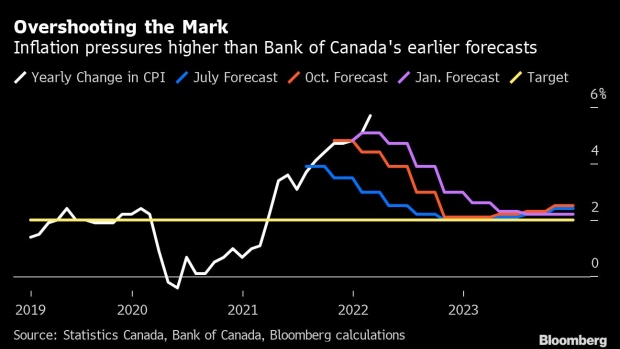Economists Now Predict Multiple Half-Point Rate Hikes in Canada
, Bloomberg News

(Bloomberg) -- Markets and economists are expecting the Bank of Canada to embark on one of the most aggressive tightening cycles in the central bank’s history as officials race to bring inflation back under control.
In a report Monday, Bank of Montreal ramped up its timeline, predicting Canada will see back-to-back, half-percentage-point hikes at the central bank’s next two policy decisions, beginning April 13. Bank of America Corp. and Citigroup Inc. are forecasting three consecutive 50-basis-point increases. Markets are more sanguine, with just one outsized move priced in over the next two decisions.
The new rate calls represent a marked shift in the outlook for borrowing costs that will take many Canadians by surprise and represent a major test for an economy with one of the highest total debt burdens in the developed world. Steeper expectations were stoked last week when Deputy Governor Sharon Kozicki said in a speech the bank will “act forcefully” to quell inflation, which is now rising 5.7% annually, the fastest pace in three decades.
“The Bank of Canada needs to take the punch bowl away as soon as possible,” Carlos Capistran, an economist at Bank of America, said by email. “We expect them to withdraw stimulus quickly.”
Other central banks, including the Federal Reserve, have pivoted to a more hawkish stance amid red flags about more persistent inflation and supply chain snarls created by the war in Ukraine. Chairman Jerome Powell and other U.S. monetary policymakers have put a half-point hike on the table for the Fed’s meeting in May and suggested more to come.
Bank of Canada officials led by Governor Tiff Macklem began the hiking cycle earlier this month, when they raised their policy interest rate to 0.5%, from the emergency low of 0.25%. Trading in overnight swaps suggest the benchmark rate will climb to almost 3% over the next 12 months -- a pace of tightening that hasn’t been seen in decades.
The Bank of Canada raised its policy rate by more than 2 percentage points in the years leading up to the global financial crisis in 2007, but that took place over a period of three years. The Bank of Canada last hiked by 50 basis points in 2000.
Perhaps the last comparable scenario was when policy makers hiked rates by a full percentage point at one meeting in 1998 to defend a sagging currency, a move that was quickly reversed just months later.
It will be tricky process, and some economists warn high household debt levels may ultimately prevent officials from moving too aggressively. Still, Macklem may be paying the price for waiting too long to start raising interest rates because of what proved to be erroneous assumptions about transitory inflation.
“The bank must now accelerate lift off because they didn’t take flight when they had a chance to earlier,” Derek Holt, an economist at Bank of Nova Scotia, said by email. “That’s going to cause more economic anxiety than if had they moved earlier.”
©2022 Bloomberg L.P.
No comments:
Post a Comment